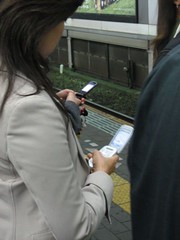 Image by mikeleeorg via Flickr
Image by mikeleeorg via Flickr
“Oh!” I exclaim, “you’re real! I’m sorry, I thought you were a machine.”
Whatever happened to those days – when telephone calls were between two or more living, breathing human beings?
I just got off the phone from that call I was making, and sure enough I get the automated attendant asking me to enter the other party’s extension. I enter it, and after a few rings, I get his voice-mail. I leave a message and hang up. Absolutely no human contact whatsoever -- yet the telephone originally was designed to bring people closer together.
I remember a slogan from an old AT&T television commercial in the 1980’s – reach out and touch someone. The series of commercials won awards in the advertising industry for its moving portrayal showing tearful eyed family and friends reaching out and touching their loved ones over great distances.
That was back in the 1980’s, just as personal computers were starting to pop-up in our homes. And the Internet – unless you were working in some secret American military base in deep cover, or a professor at some big university fighting to make that secret public, forget about it. Home computers in the 1980’s were considered top-of-the-line if they had a hard drive – most only had those big flimsy 5.25-inch floppy disks.
Looking back to those days, it always amazes me as I consider how far we have come.
These days, I know nine times out of 10 when I call someone, chances are I’ll be greeted by an automated voice-mail system. So I instinctively have my 30-second-or-less message ready to go in my mind’s eye, and I know to either enter an extension or wait for the beep.
Technology has trained us well.
The other day I was at a bank machine in the city’s downtown core. An elderly woman who probably didn’t venture downtown too often was getting frustrated at the machine, thinking it wasn’t working correctly, because it wasn’t beeping when she pressed the buttons.
In many large city centres, some banks have disabled the tones given off by their bank machines in outdoor spaces, to reduce crime. Apparently, some people can actually nab your PIN by listening carefully to the tones.
I waited patiently behind this sweet old lady, as she ran back and forth from the tellers to the bank machine, having one of the tellers come out and explain this to her.
The old lady was trained by technology to automatically think that if the bank machine didn’t “bleep” out the numbers as you entered them, the machine had to be broken.
We are a highly adaptive society, and when a new piece of technology emerges, we learn its teachings quickly.
I remember reading about some teenager that won about half-a-million dollars in a contest to determine who the fastest text messager was.
I have one of those smart phones, and it sure has a bigger keypad from the cell phones I’ve had in the past. It is even on that 3G network, so it’s supposed to be fast – though I hear 4G is already on the way.
Even still, when it comes to sending text messages, I’m all thumbs. I use that T-9 predictive text system, which guesses most of the time the correct word I want, based on my typing habits over time. But I still constantly find myself having to erase and start words over again, simply because just as I start to get up to speed, I realize I’m “texting” too fast, and I hit the wrong combination of keys.
But a young kid in her teens – she might have even been in her pre-teens, won a large sum of money, for being able to do this.
She was trained well by technology too. She knew all the short forms commonly used to speed up the process.
That’s the problem with today’s technology – it is making the world a faster, easier place, but we’re losing that human element. We’re losing the very things which make us human, as we ourselves become more computerized, in our constantly evolving high-tech world.
![Reblog this post [with Zemanta]](http://img.zemanta.com/reblog_b.png?x-id=8d78e21e-be19-41a9-a95e-520fd0d6d04f)








No comments:
Post a Comment